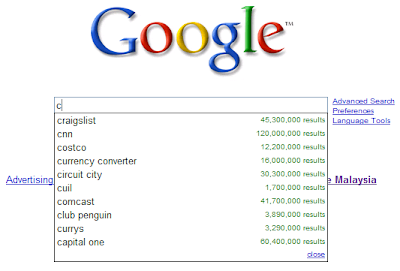
Well, China has 100+ Groupon clones and Malaysia is picking up as well on its own scale. Group buying sites are popping out lately in Malaysia. It's a bit of deja-vu like many were attempting to build a local social network site some years back...

Well, China has 100+ Groupon clones and Malaysia is picking up as well on its own scale. Group buying sites are popping out lately in Malaysia. It's a bit of deja-vu like many were attempting to build a local social network site some years back...
It was the first time in history that a Malaysian company made headlines at TechCrunch last December. Friendster, the granddaddy of social networks has been acquired by MOL Global, a Malaysian e-commerce (payment) company...

Generally, Malaysians are skeptical or reluctant to shop online due to security concerns among many. We lack smart consumers, as suggested by Danny Foo. Air Asia did a great job in our e-commerce education. Desperately in need of bargain air tickets? Learn how to shop online and brace yourself by entering the credit card numbers...

Do you have the habit of shopping at foreign online store, especially those from the west? I do, like many others, looking for bargains, stuffs that are special or not easily available here. I do have an extra small habit though...

Well, this post is all about charts and figures. Read on to get a glimpse of e-commerce outlook in selected countries of Asia Pacific. Hopefully, you will get a rough idea on those markets that you are not particularly familiar with...

Blogshop seems to be an unique trend booming only in Singapore and Malaysia. Perhaps, many Singaporeans or Malaysians are accustomed to browse and navigate around blogshop but certainly not me (some might agree with me on this)...
Be it Google in Malaysia, or a Malaysian startup in TechCrunch50.
Malaysia is ranked at a mere no.36 in IT industry competitiveness index 2008, among 66 countries being sampled. We remain unchanged from the position in 2007.

We are no.8 in Asia-Pacific, in which Taiwan has emerged as no.1 with previous Asia leader Japan slipped to no.5.
With the advent of High Speed Broadband (HSBB), Malaysian can finally look forward (fingers crossed) to better technology infrastructure.
HSBB is a premium broadband service with speeds of 10Mbps (Megabits per seconds) to 100 Mbps for residential customers and up to 1Gbps (Gigabits per seconds) for businesses for high economic impact areas delivered via fibre optic infrastructure. (Source)
Malaysia largest bank off and on the internet, having nearly one million active users on their banking portal, is finally making a step into Web 2.0 arena.
Maybank have just launched a blog, and more importantly a revamp of their existing cluttered Maybank2u site, being branded as M2U 2.0 (currently in beta).

Unlike China, Japan or Korea with their own preference of web design principles, Malaysians generally don't really have one. We can easily adapt to an info-packed site like Lelong, or a Web 2.0's theme site like Tumpang. This might be due to our unique multi-racial community and English competency to be influenced by Western web design concepts.
If you are a web design beginner, this book is a must for you. If you are in web industry (be it project manager or techie), this might improve your work effectiveness with designers or customers. Some basics in HTML, CSS, Photoshop are welcomed, but not compulsory before reading this book.
Universiti Sains Malaysia (USM) has been granted APEX status beating eight other local competitors. Some people say that this is a "shiok sendiri" (self-consolation) award as local universities had fared badly in World University Rankings 2007. Universiti Malaya (UM) was highest ranked with no. 246 and followed by USM with no. 307.
There must be reasons why Harvard, Stanford, Illinois are top world universities. Let's look at it from a different perspective, on famous brains (in web industry) produced by these universities, just to name a few:
Google Suggest has graduated from Google Labs and appears at their homepage (US site).
If "c" is entered, terms suggested by Google will appear as below. If you inspect the "suggested list", you can see that Google rank the terms by "popularity" instead of the number of returned results.

A few interesting points from the following slide, even though most of the statistics are from 2007:
Green Packet is definitely hot in the news nowadays thanks to its WIMAX roll out in the country through Packet One. They are also having an eye on the content business through the launch of the social network site, Ruumz. Quite an exotic name by Malaysia's standard huh?

After so much rumours among the industry insiders, it is finally making its debut although it is still in beta currently. You can only join by invitation at the moment.
Copyrighted Malaysia Crunch. Converted To Blogger Template by Anshul .
Powered by Blogger | Theme by Simplywp
